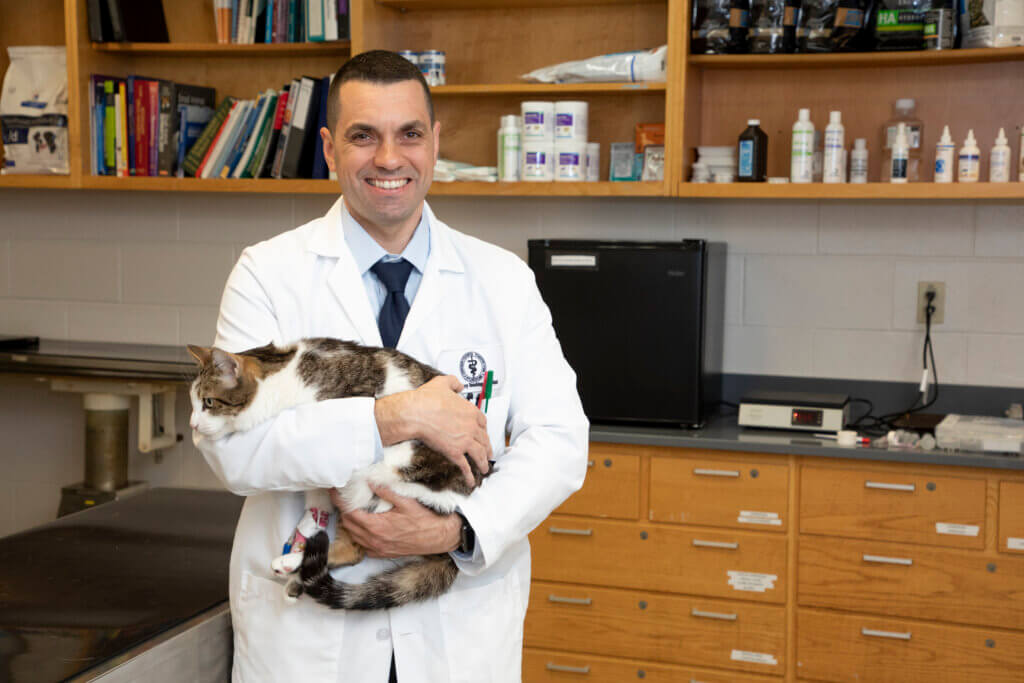
“How do we get rid of these fleas?” That’s the question that begins an Indianapolis Star article by reporter Karl Schneider published July 12. The answer includes advice from Dr. Paulo Gomes, clinical assistant professor of dermatology in the Purdue University College of Veterinary Medicine’s Department of Veterinary Clinical Sciences.
The news story begins by noting how fleas begin invading homes across the state from mid to late summer. The article goes on to answer the question, “How can I keep fleas out of my house and yard and what are some of the complications the pests can cause?” The story points out that wildlife and strays bring fleas to peoples’ backyards from raccoons, possums and squirrels and other small mammals that all provide good hosts for fleas. Quoting Dr. Gomes, the article then explains that stopping flea infestations before they start involves reducing the pets’ contact with these animals or the places where they are commonly found, as well as not feeding strays.
Once a flea infestation is identified, the article goes on to say, the work begins. Dr. Gomes and the other expert quoted in the story, Indiana University Emeritus Professor and medical entomologist Marc Lame, both emphasize the importance of more frequent vacuuming to help get rid of flea eggs and the younger stages of fleas. “Vacuuming is very important,” Dr. Gomez is quoted as saying. “Dispose the dirt in a sealed plastic bag or trash bag.”
The story goes on to explain that the next step is applying some kind of pesticide to the pets, quoting Dr. Gomes as advising pet owners to remember to apply it to all pets, not just the one showing signs. Dr. Gomes noted there are active ingredients in some over-the-counter applications that work well, including pyriproxyfen, pyrethrins and permethrin, but he emphasized the importance of reading the labels and following them carefully, explaining that kittens and puppies will require extra caution, and some of the ingredients can be toxic to cats. “You need to be careful with cats because they are naturally more susceptible to toxic effects,” Dr. Gomes said. “Permethrin is very toxic for cats so should be avoided.”
Dr. Gomes also pointed out that, when pets owners notice fleas on their pets, they’re only seeing about one to five percent of the population living in the home. “The other 95 percent are immature stages of the flea lifecycle in the form of eggs, larvae and pupi,” Dr. Gomes said. “What you don’t see on the animal is in the environment.”
An adult flea can lay 40-50 eggs per day, or up to 3,000 eggs in its lifetime, which can make a small problem big in a short period of time, the article notes, as it also relays Dr. Gomes’ characterization of fleas as very efficient reproductive machines. “That’s why cleaning indoors is important,” Dr. Gomes said. “Removing immature stages from the environment and trying to avoid them becoming adult fleas.”
Once fleas enter the house, it can take up to 12 weeks to completely get rid of the infestation, so vigilance is important, the story pointed out, while also noting that fleas also can carry infections and some types of typhus. Dr. Gomes explained that typical symptoms in a pet may include fever, lack of appetite, depression, lameness and coughing.
Click here to view the complete Indy Star story.
